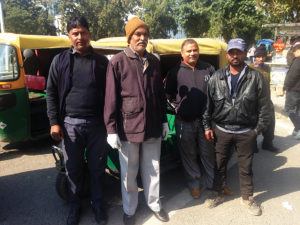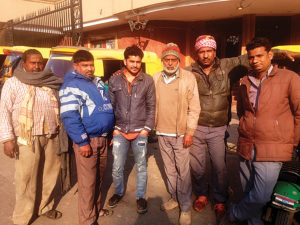Delhi’s auto wallas played a crucial role in AAP’s 2015 victory as the party’s supporters cum advertisers. But things have changed now and the sentiment is not so strong
The Aam Aadmi Party garnered massive support in Delhi Assembly elections of 2015, getting 67 of 70 Assembly seats. The dominant feeling was that the city’s three-wheeler rickshaws made him victorious. How?
By advertising to vote for the jhaadu symbol.
Back then, from the over 1 lakh auto rickshaws which plied in Delhi, 30,000 had —according to the AAP’s plan —campaigned for Arvind Kejriwal’s party. Now with 2018 figures showing 1,11,674 auto rickshaws registered in Delhi, the party would have hoped to get more to campaign for them. But Upendra Singh, treasurer of AAP’s union of auto-rickshaw drivers, says the love is wearing off.
He adds that many auto rickshaw drivers have already removed the posters that the AAP had given them. “If it is what they feel like doing, then it’s fine. We can’t force them (to put up posters), can we?” he asks.
Singh has not lost hope though. He believes that if the government accepts and moves forward with the proposal of increasing the auto rickshaw fares — the apparent bone of contention between the auto drivers and AAP —over 1 lakh auto wallahs will support them.
“For the last eight months, we have been talking about this issue”.

Even though a meeting was held with Kejriwal in July and then a committee was constituted later (in November) to revise the auto fares, nothing has come about. And at this point, Singh says, the auto drivers think that nothing is going to happen.
But Patriot didn’t find the situation quite as grim for the AAP, as Singh points. Almost every driver we spoke to, pointed to the fares that the party is unable to raise as a definite negative point.
Only a few said that they would not vote for the AAP. One is Ramji Kumar who has been driving his auto for the last four years. Calling the fares the major issue he has with the current government, he went on to explain about all the other price hikes. “First the auto fee was Rs 200 a year, which is now Rs 500. The permit fee was Rs 500, now it has become Rs 1,000. The insurance was Rs 2,500 for a year and now it’s Rs 6,000. CNG that was Rs 34 per kg earlier, it is now priced at Rs 44.70 per kg. How then will we sustain ourselves?” Kumar questions.
“For the last six years, nothing has been done for us,” he adds. By six, Kumar is taking into account the first time the party came into power in 2013 with conditional support from the then incumbent Congress. After 47 days in power, it abdicated its role coming back with a thumping majority in 2015.
Another driver who says that he will not vote for the AAP is Raj Kumar, who has been driving an auto rickshaw in Delhi since 1990. “First, he came to power for the people, now he wants to become the prime minister,” he accuses.
He adds in the same breath that Kejriwal cannot do anything to stop the police from constantly levying challans on them because he has “no power.” “The traffic and Delhi police personnel always come after us and the Delhi government can do nothing about it,” he alleges.

With Delhi being a union territory, the law enforcement agencies come under the central government’s Ministry of Home Affairs. And this lack of power is something that AAPs supporters too, point towards.
Like CD Singh who reckons that there shouldn’t even be an election held for the chief minister’s post in Delhi. Yet, his loyalty remains with the Delhi government. And why? Because, “No one is like him (Kejriwal), he is so educated. Compare that to the BJP netas, who have studied only till school, how can they be a match?” he questions.
Others join in the chorus. Adding their two cents as to why the Kejriwal government is the only government for them.
“Apni party lagti hain, (we feel like it is a party meant for people like us)” is one such line that is almost playing on a loop from the lips of the auto rickshaw drivers that do support this party of “the common man”, unlike the party of “businessmen” — which according to them, is the BJP.
Mohammad Sher Afghun wants us to write that the support for Kejriwal comes because he is a “different politician,” one who “counted us as human beings.”
By this time, many more auto rickshaw drivers had congregated, excited to talk about their vote and who has their favour. They speak of how this government has provided their kids with good education in government schools, “which are even better than privates ones now.”
“We as parents are not worried anymore. We know our children will study well,” one added. Afghun tells us about a passenger he once picked up. “She was in such a hurry because she was getting late. She was a government school teacher”— this was an example that he wanted to site to show how important attendance was for these teachers now, who were earlier known to be unscrupulously late or low on attendance.
The supporters also pointed towards the “improved” healthcare system, free electricity and water. None of these men are part of a union. They allege that the union only takes money from them and do not take their problems into consideration, adding that when they agitate, their strike is called off after taking money from the government,.
Those who are part of the unions are asked to vote for a certain party. A few members of the Delhi Autorickshaw Sangh we met, say that they never care about whom the union leader support. “Different unions have different parties that they support. But we do what we want. We don’t listen to anyone,” Naseed with his beetlenut stained lips, tells us.
One thing different about being a part of the union is perhaps, the direct connect with AAP workers. Naseed often gets phones calls from AAP workers.
While the leader for looking into AAPs affairs with the auto rickshaw drivers believes the support has dwindled, on ground at least, many still seem to support the party of Kejriwal. The party’s fate for Lok Sabha elections remains to be seen.





